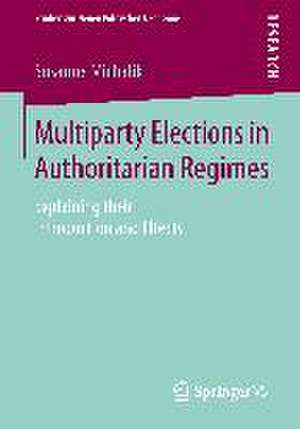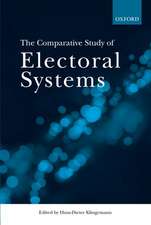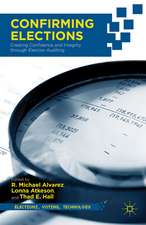Multiparty Elections in Authoritarian Regimes: Explaining their Introduction and Effects: Studien zur Neuen Politischen Ökonomie
Autor Susanne Michaliken Limba Engleză Paperback – 21 apr 2015
Preț: 346.48 lei
Nou
Puncte Express: 520
Preț estimativ în valută:
66.30€ • 69.41$ • 54.86£
66.30€ • 69.41$ • 54.86£
Carte tipărită la comandă
Livrare economică 05-19 aprilie
Preluare comenzi: 021 569.72.76
Specificații
ISBN-13: 9783658095109
ISBN-10: 3658095105
Pagini: 160
Ilustrații: XII, 148 p. 10 illus.
Dimensiuni: 148 x 210 x 12 mm
Greutate: 0.22 kg
Ediția:2015
Editura: Springer Fachmedien Wiesbaden
Colecția Springer VS
Seria Studien zur Neuen Politischen Ökonomie
Locul publicării:Wiesbaden, Germany
ISBN-10: 3658095105
Pagini: 160
Ilustrații: XII, 148 p. 10 illus.
Dimensiuni: 148 x 210 x 12 mm
Greutate: 0.22 kg
Ediția:2015
Editura: Springer Fachmedien Wiesbaden
Colecția Springer VS
Seria Studien zur Neuen Politischen Ökonomie
Locul publicării:Wiesbaden, Germany
Public țintă
ResearchCuprins
The Introduction of Multiparty Elections in Authoritarian Regimes.- Authoritarian Multiparty Elections: Boon or Bane for Public Policies?.- Foreign Aid for Multiparty Authoritarian Regimes.
Notă biografică
Susanne Michalik is working as a researcher at the Federal Statistical Office (Destatis).
Textul de pe ultima copertă
Susanne Michalik analyzes why authoritarian regimes allow for multiparty elections and how they affect political outcomes. Even though their introduction rarely leads to a change in power, such elections should not be regarded as mere window-dressing. She argues that competitive elections are installed to deal with a split among the incumbent elite and to facilitate the formation of a new ruling coalition. In a cross-national study the author finds that elections matter and the ruling party does more than just manipulate election results in order to be reelected. Incumbents provide a mix of public goods and targeted public goods depending on the level of electoral competition they are experiencing. The outcome of authoritarian multiparty elections in the form of the legislature’s party composition also has an effect on the regime’s international relations in the form of foreign aid allocation.
Contents
Susanne Michalik is working as a researcher at the Federal Statistical Office (Destatis).
Contents
- The Introduction of Multiparty Elections in Authoritarian Regimes
- Authoritarian Multiparty Elections: Boon or Bane for Public Policies?
- Foreign Aid for Multiparty Authoritarian Regimes
- Researchers and students in the fields of political science and economics
- Journalists, diplomats, international cooperation workers
Susanne Michalik is working as a researcher at the Federal Statistical Office (Destatis).
Caracteristici
Publication in the field of social sciences Includes supplementary material: sn.pub/extras























